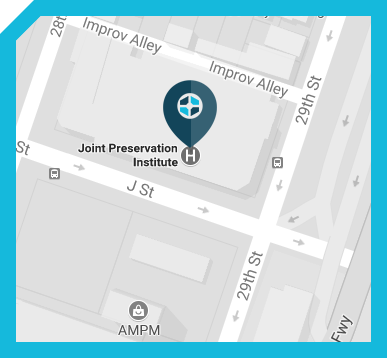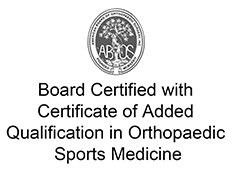 FAQ Patellofemoral Knee Replacement
FAQ Patellofemoral Knee Replacement
Am I a candidate for total knee replacement?
You are a candidate for total knee replacement if you have severe pain in your knee in combination with findings on the physical examination and x-rays, which point to arthritis of the knee. Most patients go through a relatively extensive course of nonsurgical treatment such as anti-inflammatory medications, Chondroitin sulfate and Glucosamine, physical therapy, exercise, injections, and occasionally bracing prior to needing total knee replacement.
What are the results of total knee replacement?
Total knee replacement has an extremely high rate of success when performed for the proper indications and with appropriate technique. Approximately 90% of patients are satisfied with the procedure at 10 years. The rate of revision (additional surgery) of the prosthesis is approximately 2-5% after 10 years. The reasons for the revision include infection, implant loosening, knee instability, or fracture.
How long will I be in the hospital?
Most patients who have a first time knee replacement spend 3-4 days in the hospital. The goals of the hospital stay are to work on getting around, allow the wound to stabilize, establish adequate levels of anticoagulation medication (coumadin).
Will I be allowed to eat normal food after the surgery?
The majority of our patients are given a clear liquid diet until they demonstrate some restoration of bowel function. The combination of medications given during the surgery with the postoperative narcotic treatment can substantially decrease bowel function.
What will I do on each of the days of my hospital stay?
The first day after surgery, you will get up with the assistance of the physical therapists. They will work with you once or twice a day to help you adjust to your new joint, to become more independent, and to improve your range of motion and strength. They will help you with transferring from your bed to standing or to a chair. As you master these skills, they will help you work on going up and down steps. Occupational therapists will also work with you on skills which you previously have taken for granted that may be difficult immediately after the surgery.
I have heard that the implants can last around 10 years and then one has to have a repeat operation every 10 years after that?
In the past, some designs of knee replacements had results that were suboptimal. This had been due to the inferior material properties of the polyethylene (plastic material used between the femoral and tibial components) and the use of certain types of components. The orthopaedic industry has made great strides in achieving high quality, uniform polyethylene. Orthopaedic research has given us additional information about where to put the components to acheive the highest longevity. In spite of this, over time the polyethylene inserts can wear out and may need to be replaced. If this is recognized early, the actual implants may be kept in place, allowing a faster surgery with less blood loss. Our goal with total knee replacement is 95% success at 10 years free of any further surgery.
Will my pain be completely gone?
The greater the degree of preoperative arthritic pain, the greater the relief after the surgery. Most patients report feeling a "different type of pain" after the surgery. Their arthritic pain is replaced by the standard surgical incisional pain. Fortunately, the incisional pain markedly decreases after the first 3 or 4 days after hospitalization.
When can I drive?
Most patients can drive after about 4 weeks. It is extremely important to be aware of one's limitations in this area. You must have full voluntary control of your legs in order to be safe. Most of our patients who are getting back to driving practice in an empty parking lot prior to actually driving on the street.
When can I go back to work?
This depends to a great degree on how physically demanding your work is. Most patients can do office type work within 3 weeks. Patients who are heavy laborers should remain out of work for a minimum of 8 weeks.
How long will I have to be on crutches?
In the majority of cases, the implants are cemented in place. The only requirement for crutches is to overcome the post-surgical weakness and inhibition of the leg muscles. The duration of this inhibition is variable. In some cases, patients are without crutches by one week while at other times, they may require some form of walking aid for more than a month.
One method to decrease the need for crutches after surgery is to work on strengthening the quadriceps and hamstring muscles prior to the surgery.
Will I be able to climb stairs?
The majority of patients are able to climb stairs after total knee replacement. Certain factors such as profound muscle weakness, post-surgical stiffness, and morbid obesity may limit this ability.
Will I be able to kneel on my knee?
Little medical research has focused on the ability to kneel on a total knee replacement. Most patients have difficulty kneeling due to pain and some residual difficulty getting up from a kneeling position. Additionally, most total knee procedures include the resurfacing of the patella bone with a polyethylene component. These components are usually only 8 to 9 mm thick (about 3/8") and may not have the mechanical strength to tolerate the stress of repeated kneeling.
Can I go back to jogging?
If muscle recovery is complete after the total knee procedure, there is no restriction on going back to any kind of activity. However, as the knee prosthesis is a mechanical device, the greater the cyclic loads applied to it the more quickly the bearings can wear out and the higher the risk of revision. A number of reports have shown a higher occurrence of repeat knee replacements in younger, more active patients.
Can I play tennis after my knee replacement?
Most patients can tolerate returning to at least doubles tennis. Competitive singles tennis may be a risk for premature failure of the implant.
I have heard about the minimally invasive technique? Am I a candidate?
You may be a candidate for total knee replacement through a limited incision. These incisions can vary in length from 10 to 15 cm with the knee straight. The most important factor to avoid complications such as infection and mechanical failure is to avoid excessive damage to the skin and muscles and to visually see the position and placement of the implants.












